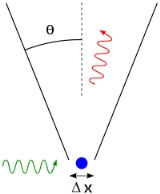
Uncertainty principle
WordNet
noun
(1) (quantum theory) the theory that it is impossible to measure both energy and time (or position and momentum) completely accurately at the same time
WiktionaryText
Etymology
named for Werner Heisenberg, its discoverer, translated into English from a variety of original German terms. Heisenberg originally called the concept Ungenauigkeit (inexactness) or Unbestimmtheit (underminedness), whereas his mentor and collaborator Niels Bohr often used Unsicherheit (unsureness). Today in German the most commonly used term for the principle is Unschärfe (blurredness or fuzziness).

